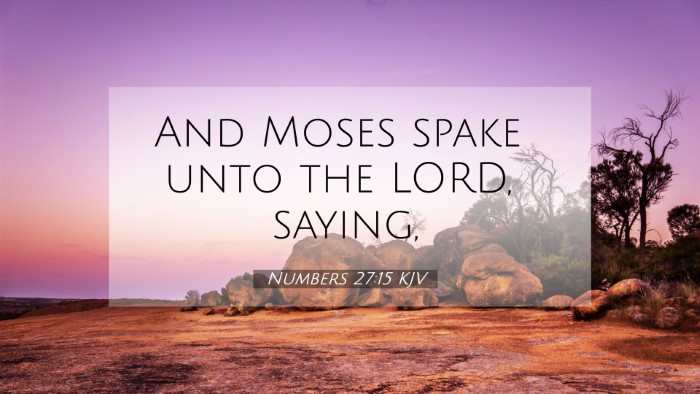Understanding Numbers 27:15
Numbers 27:15 reads, "And Moses spake unto the Lord, saying,". This verse serves as an important moment in the biblical narrative, illustrating the communication between Moses and God regarding leadership and guidance for the Israelites. Below, we analyze its meaning through various commentaries to shed light on its significance.
Contextual Background
This verse occurs during a pivotal time when the Israelites are nearing the end of their journey in the wilderness. Moses, as the leader, is concerned about the future leadership of the people of Israel. His direct communication with God indicates a reliance on divine counsel for making crucial decisions.
Insights from Public Domain Commentaries
- Matthew Henry: Henry emphasizes that Moses’s act of speaking to God shows his deep commitment to the people he leads. Moses sought God's guidance not just for himself but for the congregation, reflecting his pastoral heart. This exemplifies how leaders should always seek divine direction in critical matters, especially in times of transition.
- Albert Barnes: Barnes points out that Moses’s prayer reflects his humility and wisdom. By approaching God before making any decisions regarding succession, Moses demonstrates the importance of seeking divine will before taking action. This act is symbolic of the need for spiritual leaders to remain humble and reliant on God’s wisdom in leadership decisions.
- Adam Clarke: Clarke notes that this moment is crucial as it sets the stage for the appointment of Joshua as Moses's successor. The transition of leadership is a significant theme throughout the Bible, emphasizing the necessity of strong spiritual continuity for the community. Clarke highlights that Moses’s approach to God is indicative of the nurturing relationship between a leader and the divine.
Thematic Analysis
Numbers 27:15 opens a broader discussion on leadership, the importance of divine guidance, and the role of prayer. This verse illustrates the principles of:
- Necessity of Divine Guidance
- Succession and Continuity in Leadership
- Prayer as a Means of Seeking Wisdom
Biblical Cross-References
Several verses may relate to this passage, providing additional insights and connections:
- Deuteronomy 31:7-8: Moses charges Joshua, symbolizing the transition of leadership.
- James 1:5: Encouragement to seek wisdom from God, emphasizing the importance of divine counsel.
- Exodus 18:19-21: Jethro advises Moses on delegating leadership, indicating the need for wise counsel.
- Proverbs 3:5-6: Trusting in the Lord for direction, paralleling Moses’s reliance on God.
- 1 Chronicles 28:9: David encourages Solomon to know God and serve Him, reflecting Moses’s heart for Joshua.
- Matthew 7:7: Encouragement to ask of God in prayer, resonating with Moses’s approach.
- Philippians 4:6: The call to not be anxious, but to bring requests before God, akin to Moses’s conversation.
- Hebrews 13:17: Instruction about the church's leaders and accountability before God, reminiscent of Moses’s role.
- Acts 1:24: The apostles praying for guidance in selecting a successor for Judas, mirroring Moses's actions.
- 1 Samuel 12:23: Samuel emphasizes the importance of prayer for the leadership of Israel, akin to Moses's practice.
Applying the Themes Today
In modern life, the themes present in Numbers 27:15 can guide contemporary leaders in several ways:
- Always prioritize prayer and seeking God's guidance in decision-making.
- Recognize the importance of leadership succession and preparation.
- Approach leadership with humility, acknowledging that divine wisdom is essential.
Tools for Further Study
For those looking to explore cross-references and further insights into scripture, consider the following tools:
- Bible Concordance
- Bible Cross-Reference Guide
- Cross-Reference Bible Study Materials
- Comprehensive Bible Cross-Reference Resources
- Chain Reference Bible Study Methods
Conclusion
Numbers 27:15 highlights the importance of divine communication in leadership. By studying this verse and its context, we gain insights not only into Moses's role but also into the foundational principles of godly leadership. Each cross-reference enriches our understanding, demonstrating the interconnectedness of scripture and the continuous dialogue between the Old and New Testaments.


